|
|
|
Sort Order |
|
|
|
Items / Page
|
|
|
|
|
|
|
| Srl | Item |
| 1 |
ID:
169312


|
|
|
|
|
| Summary/Abstract |
Space-based remote sensing is playing a prominent role for disaster management and socioeconomic development in Asia-Pacific. However, the unequal access to space technology in the region prompts the establishment of regional data-sharing agreements. This situation provides an opportunity for the region's leading space powers to enhance their regional influence. By invoking the concept of concept of Normative Power from the field of international relations, this article demonstrates (1) the applicability of this concept in the space sector, through an analysis of the European space sector and (2) the usefulness for decision-makers in advanced space powers to follow its methodological framework to design efficient strategies for enhanced regional influence. In particular, this paper argues that a tight collaboration with the Association of Southeast Asian Nations on space data sharing could participate in an ambitious Japanese diplomatic strategy of enhancement of its normative influence over the Asian space sector, in times marked by the rise of other powerful regional space actors.
|
|
|
|
|
|
|
|
|
|
|
|
|
|
|
|
| 2 |
ID:
120742


|
|
|
|
|
| Publication |
2013.
|
| Summary/Abstract |
This concluding article assesses the past decade of international scholarship on the European Union (EU) and normative power as represented by the contributions to the special issue. It argues that the normative power approach (NPA) makes it possible to explain, understand and judge the EU in global politics by rethinking the nature of power and actorness in a globalizing, multilateralizing and multipolarizing era. To do this, the article assesses the past decade in terms of normative power engagement, internationalization and comparison. The article then argues that rethinking power and actorness involves reassessing global theory and pouvoir normatif in action. The article concludes by setting out three ways of developing the NPA in its second decade: macro-approach, meso-characterization and micro-analysis. Following the suggestion of Emanuel Adler, Barry Buzan and Tim Dunne, the article sets out how studying the normative foundations of power through the NPA combines the normative rethinking of power and actorness with the structural changes of a globalizing, multilateralizing and multipolarizing era.
|
|
|
|
|
|
|
|
|
|
|
|
|
|
|
|
| 3 |
ID:
131882
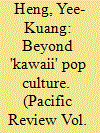

|
|
|
|
|
| Publication |
2014.
|
| Summary/Abstract |
Many studies of Japan's soft power are premised on the 'affective' dimensions of its kawaii pop culture that generate liking or interest. While entirely warranted, emphasising cultural attraction does not do sufficient justice to the multi-faceted foundations of Japanese soft power. Neither does it recognise other components of Joseph Nye's soft power framework stressing the 'normative' appeal of policies that reflect global norms. This article investigates the 'normative' dimensions of Japan's soft power on climate change, and whether it translates into international influence, as Nye predicted. The first section examines the Cabinet's 2010 New Growth Strategy, identifying a potential source of 'normative' soft power in its self-proclaimed desire to reinvent Japan as a 'trouble-shooting nation on global issues', specifically environmental challenges. Next, it analyses how Japanese entities (government, corporations, and NGOs) can transmit 'normative' soft power, and obstacles encountered. These transmission mechanisms include 'Cool Earth Partnership' programmes, the 'Future City Initiative' and the values-based Satoyama Initiative. The final section addresses conceptual implications that arise, and assesses whether Japan's 'normative' soft power has paid dividends. Drawing from literature on pioneer states and external reviews of Japan's alignment with key climate norms, the paper suggests that Japan's normative soft power is lacking in driving agendas at global climate forums. At a pragmatic problem-solving level, however, Japan is increasingly perceived as an attractive source of transferable solutions, reflecting climate norms such as developing eco-friendly technologies and providing assistance to help vulnerable countries mitigate climate change
|
|
|
|
|
|
|
|
|
|
|
|
|
|
|
|
| 4 |
ID:
125903
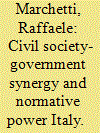

|
|
|
|
|
| Publication |
2013.
|
| Summary/Abstract |
There is a need for a reassessment of the Italian contribution to international affairs. If a more comprehensive and pluralist reading of Italian action at the international level is developed, an image of normative power Italy may emerge. Italian input has been crucial in a number of transnational campaigns that have had significant impact at the international level. The cases of the peace in Mozambique, the International Criminal Court, the Moratorium on the Death Penalty and, more recently, the Ban on Female Genital Mutilation all illustrate Italy's contribution to international affairs, especially the politics of norm change. These cases are all characterised by the presence of intense civil society-government synergy. In order to advance the understanding of the processes and impact of transnational mobilisations, this analysis examines the domestic conditions that facilitated such synergy, intended as key conditions for the empowerment of transnational activism itself.
|
|
|
|
|
|
|
|
|
|
|
|
|
|
|
|
| 5 |
ID:
120741


|
|
|
|
|
| Publication |
2013.
|
| Summary/Abstract |
The aim in this contribution is to amplify the call, articulated across a range of disciplines relevant to international politics, for a paradigm shift that decentres the study and practice of Europe's international relations. Such a perspective is necessary both to make sense of our multipolar order and to reconstitute European agency in a non-European world. The analytical categories proposed in this article for a decentring agenda - provincialization, engagement and reconstruction(s) - can help to navigate the nexus of the empirical and the normative in such a decentring process. Applying the decentring logic to the EU's own foundational narrative, the authors suggest that, only by acknowledging the inflections of colonialism in the EU project itself, can the Union reinvent its normative power in the 21st century.
|
|
|
|
|
|
|
|
|
|
|
|
|
|
|
|
| 6 |
ID:
137812
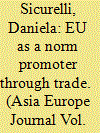

|
|
|
|
|
| Summary/Abstract |
This paper investigates how the external images of the European Union (EU) shape its identity vis-à-vis the USA and focuses on how Vietnamese elites perceive EU-sponsored norms in the context of the ongoing bilateral trade negotiations. The EU emerges as an actor able to export regulatory standards, improve the status of its trade partner within multilateral forums and, at the same time, respect the local ownership of the development process. At the same time, it is criticized for the lack of coherence in its foreign policy, its internal divisions and intrusiveness in Vietnamese domestic politics. Moreover, differences emerge in the way government and non-governmental actors portray the EU, further challenging its univocal representation as a political leader. These perceptions have implications concerning the EU’s ability to export its constitutive principles and values to Vietnam. More broadly, this case study provides insights into the prospects of a future interregional trade agreement with the ASEAN and carries out a critical assessment of the identity and role of the EU as a normative power.
|
|
|
|
|
|
|
|
|
|
|
|
|
|
|
|
| 7 |
ID:
120737
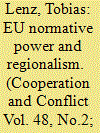

|
|
|
|
|
| Publication |
2013.
|
| Summary/Abstract |
The ideational impact captured by Manners's notion of normative power Europe (NPE) appears most distinct and potentially most consequential in the realm of regionalism. However, empirical research on the topic has been hampered by the focus on EU actorness and methodological difficulties. Drawing on diffusion theory, this article develops conceptual, theoretical and methodological foundations for conceiving NPE as ideational diffusion. It argues that Europe's ideational influence on regionalism can be fruitfully understood as the largely indirect process by which the EU experience travels to other regions through socialization and emulation. Yet, as structural conditions vary across regions, EU ideational diffusion rarely leads to similar or even comparable institutional practices and outcomes. A choice-orientated approach is proposed for examining these claims empirically, which focuses on specifying the underlying counterfactual: political decisions in regionalism would have been different in the absence of the EU. The article concludes by outlining the analytical and normative promise of the proposed recasting of Manners's original concept.
|
|
|
|
|
|
|
|
|
|
|
|
|
|
|
|
| 8 |
ID:
168966
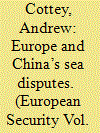

|
|
|
|
|
| Summary/Abstract |
China’s disputes with its South East Asian neighbours and Japan in the South and East China Seas have emerged as important tests of the implications of China’s rise, posing dilemmas not just for regional states but also for other global actors, including European states and the European Union (EU). European responses to these disputes have pulled in three directions: a normative approach emphasising the resolution of disputes within the framework of international law; a power balancing approach, led by France and the United Kingdom, involving support for freedom of navigation operations and strengthened bilateral and EU ties with other Asian states; and de facto acquiescence to Chinese advances in the region. In terms of understanding EU foreign policy, this case suggests a sequence: a normative approach as the initial default EU policy; a turn to power balancing when the effectiveness of that policy is called into question, but also the possibility of acquiescence and consequent divisions amongst EU member states. Europe faces dilemmas in balancing support for the United States, Japan and the South-East Asian states with its strategic partnership with China, but in practice European policy is much closer to that of the former group than that of Beijing.
|
|
|
|
|
|
|
|
|
|
|
|
|
|
|
|
| 9 |
ID:
189020


|
|
|
|
|
| Summary/Abstract |
The Indo-Pacific region and its politics are now in obscurity, and the power dynamics of US-China competition have become well settled within a new concept of geopolitics. As an economic giant and a distinct power in IR, the EU’s position and strategy in the region are garnering attention. This paper starts by discussing the EU’s perceived systemic rivalry with China and its falling out with the United States, its Atlantic ally since the two World Wars. It then introduces the concept of Europe as a normative power in order to better understand the EU’s policies. It points out how “Normative Power Europe” (NPE) has adapted to its surroundings by introducing the concept of principled pragmatism concept in 2016. The paper then lays out the EU’s security strategies in Asia and highlights its narrative of strategic autonomy, referred to as the Sinatra doctrine. From there, it employs the notion of NPE and principled pragmatism to delineate the EU’s unique stance in the Indo-Pacific region and how it puts this principled pragmatism into practice. Finally, it analyzes how the EU has strategically applied these concepts to succeed in its own way amidst US-China competition in the Indo-Pacific.
|
|
|
|
|
|
|
|
|
|
|
|
|
|
|
|
| 10 |
ID:
096118


|
|
|
|
|
| Publication |
2010.
|
| Summary/Abstract |
Much of the existing literature on the European Union (EU), conflict transformation and border dynamics has been premised on the assumption that the nature of the border determines EU intervention and the consequences that flow from this in terms of EU impact. The article aims to transcend this literature through assessing how domestic interpretations influence EU border transformation in conflict situations, taking Cyprus as a case study. Moreover, the objective is to fuse the literature on EU bordering impact and perceptions of the EU's normative projection in conflict resolution. Pursuing this line of inquiry is an attempt to depart from the notion of borders being constructed solely by unidirectional EU logics of engagement or bordering practices to a conceptualization of the border as co-constituted space, where the interpretations of the EU's normative projections by conflict parties, and the strategies that they pursue, can determine the relative openness of the EU border.
|
|
|
|
|
|
|
|
|
|
|
|
|
|
|
|
| 11 |
ID:
080304
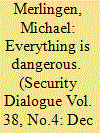

|
|
|
|
|
| Publication |
2007.
|
| Summary/Abstract |
The article builds on the existing critique of `Normative Power Europe' (NPE), extending it in previously unexplored directions by drawing on the work of Michel Foucault. The author conceptualizes and empirically demonstrates the hidden face of European Union (EU) norm diffusion. The EU promotes human agency abroad through the promotion of fundamental civil, political and economic rights. This is the celebrated face of European foreign policy. Its other face - ignored by students of NPE (proponents and critics alike) - is that the EU's self-styled mission for humanity inscribes the very agency of those it seeks to empower in relations characterized by epistemic violence, the technologization of politics and administrative arbitrariness. The author delimits a conceptual space for investigating the two faces of NPE, making the case for a micropolitical analysis of EU norm diffusion. In two empirical snapshots, the article brings into focus the deep ambiguity of the EU's post-sovereign normative power.
|
|
|
|
|
|
|
|
|
|
|
|
|
|
|
|
| 12 |
ID:
178692
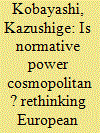

|
|
|
|
|
| Summary/Abstract |
Despite the apparent consensus that European Union (EU) normative power embodies a Kantian cosmopolitan approach to world politics, such a consensus is typically presupposed by scholars, rather than being critically examined by them. By offering macro-historical reflections, this article argues that EU normative power deviates from the Kantian cosmopolitan ideal and in fact replicates the Hobbesian logic of normative homogenization. Renouncing the medieval Vatican’s ambition to construct a united Europe anchored in uniform normativity, Kantian theory celebrates multiple normalcy as the basis for human freedom, perpetual peace, and mutual transformation. In contrast, Hobbesian theory is driven by the conviction that a peaceful value-based community could be built only through normative homogenization, behavioural conformism, and moral unity. In Hobbesian theory, the Leviathan exercises a transformative power to socialize others, eliminate discords, and build a commonwealth through norm diffusion and public education. In this vein, the EU’s aspiration to build a normatively homogenous Europe seems to reflect Hobbes’s vision of normative unity, rather than Kant’s vision of cosmopolitan diversity. Should the EU aspire to pursue a cosmopolitan foreign policy, it needs to pay more attention to the power-political implications of its drive toward normative homogenization and shift its focus from socialization to mutual transformation.
|
|
|
|
|
|
|
|
|
|
|
|
|
|
|
|
| 13 |
ID:
168968
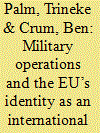

|
|
|
|
|
| Summary/Abstract |
For long, its lack of military means served to single the European Union out as a “civilian” or “normative power”. However, since 2003 twelve EU military operations have been launched. On the basis of a comprehensive analysis of all EU military mission so far, this article seeks to establish how these missions have evolved over time and how they have affected the character of the EU as an international actor. For this purpose, the article outlines four ideal-typical conceptions of the EU's international identity and operationalises them along two underlying dimensions: justification (the purpose of military operations) and policy-embeddedness (the coordination between military means and other foreign policy instruments). Analysing the military operations along these two axes, the article suggests that the EU has been evolving towards a “Liberal Power” identity, as is reflected in a shift from value-based to utility-based justifications, while military operations have at the same time become more embedded in the EU's overall foreign policies.
|
|
|
|
|
|
|
|
|
|
|
|
|
|
|
|
| 14 |
ID:
153836


|
|
|
|
|
| Summary/Abstract |
Periodically, India has sought to act as a ‘normative power’ in international affairs, advancing a normative agenda about how states and other actors ought to behave, what norms and rules should regulate their interactions, and what institutions should exist to make and enforce them. The rise to power of Narendra Modi, who became India's prime minister in May 2014, with a declared aspiration to once more make India a vishwaguru (‘world guru’) and a ‘leading power’, has generated debate about whether India will again become a normative power. This article analyses the intellectual resources with which Modi might construct that new normative agenda. These resources include the work of a number of key Hindu nationalist thinkers with whom Modi is well acquainted, but also the thought of Swami Vivekananda, for whom Modi claims a special devotion. The article concludes that constructing a new normative agenda for a revived ‘normative power India’ out of these resources will be difficult, given the limited usefulness of these intellectual resources, and that Modi's government will likely continue to pursue an essentially pragmatic foreign policy designed above all to further India's domestic economic development.
|
|
|
|
|
|
|
|
|
|
|
|
|
|
|
|
| 15 |
ID:
120735


|
|
|
|
|
| Publication |
2013.
|
| Summary/Abstract |
Introduced by Ian Manners in an article published in 2002, the idea of 'normative power Europe' has been very widely debated by scholars in the fields of European studies and international relations. This article marks the first decade of scholarship on normative power Europe through a critical engagement with the concept, its influence and the wider normative turn within the literature on the European Union's role beyond its borders. The article reviews the strands of literature that have drawn on the concept of normative power and outlines the contours of the international debate on the concept. It provides an assessment of the impact of normative power and its application through the variety of ways it has been used via engagement, reaction and counter-reaction.
|
|
|
|
|
|
|
|
|
|
|
|
|
|
|
|
| 16 |
ID:
080797


|
|
|
| 17 |
ID:
137417
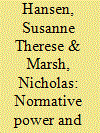

|
|
|
|
|
| Summary/Abstract |
The 2011 Libyan civil war prompted a reassessment of the normative foundation of the EU's conventional arms export control regime as armaments manufactured in Europe were used by Gaddafi's forces during the war. The EU's foreign policy identity is based, partly, upon a common approach to arms export involving respect for common criteria for export licences. Yet, prior to the civil war, considerable amounts of military equipment had been exported by member states to Libya, notwithstanding grounds for restraint on the basis of several of the criteria. This article traces member states' arms export to Libya during 2005–2010 to explore whether member states favoured restraint or export promotion. It concludes that although aware of the risks of exporting, in a competitive market for military goods, member states sought commercial advantage over restraint, and comprehensively violated export control principles. This casts doubts on assertions of the EU acting as a “normative power”.
|
|
|
|
|
|
|
|
|
|
|
|
|
|
|
|
| 18 |
ID:
120736


|
|
|
|
|
| Publication |
2013.
|
| Summary/Abstract |
This article identifies four key problems in the debate about normative power Europe that may be fruitfully tackled when linking it to the concept of hegemony: the debate about whether EU foreign and external policy is driven by norms or interests; the problem of inconsistent behaviour as a result of competing and contested norms; the question of the role of state and non-state actors in EU foreign and external policy; and the problematic standing of normative power as an academic engagement, in particular in regard to whether the theory is of primarily explanatory, descriptive or normative value. The author suggests that the concept of hegemony may address these problems. First, it combines norms and interests, thus transcending the divide that has resulted in endless debates about the EU's standing as a normative power. Second, hegemony does not start from a pre-given set of norms with fixed meanings, but rather puts the struggles about these norms at centre stage, thus seeing inconsistencies not as undermining but as part and parcel of normative power. Third, hegemony expands our understanding of the actors involved in the construction and exercise of normative power, thus bringing not only Member States but also social forces in a much broader sense into the picture. Finally, hegemony reorientates the debate about normative power so as to reinstate the critical purpose that the concept was supposed to have from the start.
|
|
|
|
|
|
|
|
|
|
|
|
|
|
|
|
| 19 |
ID:
168954
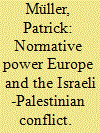

|
|
|
|
|
| Summary/Abstract |
This article conceives the EU’s normative power in the Israeli-Palestinian conflict as a narrative that projects views of the international system, the EU’s identity as a peacebuilder, and its positions on specific conflict issues. Highlighting the importance of local narratives as cultural filters, this article argues that a high degree of alignment of local narratives with key elements of the EU’s normative power narrative facilitates positive images of the EU as a normative power in peacebuilding, whilst diverging local narratives tend to give rise to more critical views. Yet, the case of Palestine also shows that strong narrative alignment with the EU may encourage high expectations, resulting in critical views about inconsistencies between the EU’s normative aspirations and its actual foreign policy conduct.
|
|
|
|
|
|
|
|
|
|
|
|
|
|
|
|
| 20 |
ID:
120738
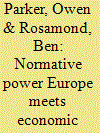

|
|
|
|
|
| Publication |
2013.
|
| Summary/Abstract |
This article offers a reading of 'normative power Europe' (NPE) suggesting that the concept has been used for two distinct purposes: as a distinctive ontological characterisation of the EU, on the one hand, and as a critical approach to the study of the EU and its external projection, on the other. These positions are labelled 'NPE ontological reality' (NPE-OR) and 'NPE critical ontology' (NPE-CO), respectively, and this article sets out to show how they might work together in practice, even if they are incommensurable in theory. It is argued that NPE's ethico-political value resides in the extent that it embodies an ontologically plural reality, never entirely defined. By drawing attention to a blind-spot in the NPE position - the constitutive importance of economic liberalism ('market cosmopolitanism') to the EU's post-Westphalian character - attention is drawn to the normative basis of market cosmopolitanism and its connections to NPE-OR are described. It is argued that, from an NPE-CO perspective, we should exercise caution in celebrating NPE-OR as post-Westphalian reality to the extent that it is rooted in a market cosmopolitics.
|
|
|
|
|
|
|
|
|
|
|
|
|
|
|
|
|
|
|
|
|